Lawyer Ego Scams: What You Need to Know

Lawyers often ask me whether they should join a particular organization, purchase an enhanced listing, or add a badge to their website. The answer depends on a few factors:
- Is the company or organization reputable?
- Does being listed on their website provide any value?
- Does the badge or insignia hold any true meaning?
- Is it a scam?
To answer these questions, we must determine which category the company or organization falls into. By looking at the big picture, you can group these companies or organizations into three categories:
Nonprofit Legal Associations
In the legal industry, nonprofit organizations are the only entities that might provide a true measurement of the lawyer’s merit and accomplishments within specific areas of practice.
Nonprofit organizations provide valuable education and resources to help lawyers improve their practice and competency. These honorable organizations pride themselves on their commitment to advancing the legal profession.
The different type of nonprofit legal organizations include:
- Regulatory bar associations
- Voluntary bar associations
- Educational (501c3)
- Advocacy (501c4)
- Academic institutions and Fellowships
- ABA-accredited board certification programs
To fall into this category, the organization must:
- Be a tax-exempt nonprofit organization
- Have a board of directors
- Provide CLE (continuing legal education)
- Have regular events such as meetings, seminars or conferences
Legal associations are the backbone of the legal industry. Unfortunately, most nonprofit legal associations are behind the curve when it comes to technology.
Many of these associations existed long before the internet. Some of them since the 19th century. Typically, these associations do a very poor job of getting in front of consumers. This brings me to our second category.
Commercial Lawyer Directories
The most prevalent commercial entities within the legal industry do a fantastic job of getting in front of consumers. By utilizing powerful data-driver technology and robust marketing strategies, commercial lawyer directories are easily found by consumers and provide a user-friendly experience.
These types of commercial lawyer directories include:
- Lawyer Legion (disclaimer: I am a stakeholder and co-founded the directory)
- Avvo
- Justia
- FindLaw
- SuperLawyers
- Martindale
- Best Lawyers
While these commercial lawyer directories are reputable, they are often very gimmicky. Most of them use a subjective rating system to determine how a lawyer compares to other lawyers. Avvo’s 10 out of 10 “Superb,” Martindale’s “AV Preeminent,” and the “Super Lawyer” are all examples of this.
The criteria for these subjective ratings rely heavily on peer endorsements, or in other words, popularity contests. If you have 10 friends who will endorse you, congratulations, you’re a super-duper lawyer.
Because these ratings are particular to a specific practice area, the rating provides little value. Nevertheless, these large-scale commercial operations are legitimate and rank very well in Google’s search results. Consumers do find them and use them.
For these reasons, it might make sense to purchase an enhanced listing in these directories if it provides a return on the investment (although I do not recommend displaying the logo on your law firm’s website).
All of these commercial lawyer directories utilize some sort of “pay-to-play” system for determining who ranks at the top of search results. Some are worse than others. For example, Avvo no longer displays your phone number or links to your website on its free listings.
The same goes for Martindale and SuperLawyers but those directories will not display your headshot or bio either. Lawyer Legion and Justia, which in my completely biased opinion are the two best, will allow you to display all of your contact info, photos, bio, and social media on free listings.
True merit cannot be measured with a subjective rating or some flattering adjective. The label of superb, excellent, premium, or super-duper lawyer nor the amount of money they spend on advertising are indications of how well the lawyer will perform in representing someone facing a specific type of legal issue.
Again, only the nonprofit sector can provide any true indication of merit. One of the reasons these commercial directories have been so successful is because they play into the lawyer’s ego. By being labeled with these flattering adjectives, the lawyer feels special. Which brings me to our third and final category.
Lawyer Ego Scams
These types of directories are not reputable, the listings provide absolutely no value, and the insignias are completely meaningless.
Disclaimer: By using the word “scams” I am not implying that they are doing anything illegal. I am not saying that they don’t deliver what they promise to their members. The product delivers a phony “award” which is exactly what the member ordered.
A phony “award” you have to pay for which comes in the form of a generic graphic, a meaningless plaque, and a misleading unverifiable claim that you are better than other lawyers. I use the word “scam” as a matter of opinion. I am simply pointing out that they are totally bogus. These companies use questionable marketing strategies to mislead consumers.
All of these scams share the following characteristics:
The entities are operated by just one individual or a small group of individuals. The entity has no events, seminars, or conferences. The business address is usually just a virtual office or a UPS Store mailbox. It’s often difficult to find the identity of who runs the scam.
You won’t see them exhibiting at legitimate events in the legal industry. Unlike the reputable commercial lawyer directories, which are operated by large teams of professionals providing legitimate services, the scams are operated entirely by a single individual or a small group of individuals.
These companies provide no legitimate services whatsoever.
The entity masquerades as a nonprofit organization. The name of these entities often includes words like: “forum,” “institute,” “society,” “association,” or “academy,” to try and mimic actual nonprofits. Some of them even claim to have a board of directors or board of regents, but don’t provide a list of names of the people serving on this board (because it doesn’t exist).
This sort of misleading language is an attempt to fool the consumer into thinking it is some legitimate nonprofit. They are anything but. In fact, some of them are extremely profitable.
The entity plays into a lawyer’s ego. These scams will prey on the egotistical lawyer. By using laudatory language like “top,” “best,” “distinguished,” or “premier,” lawyers will feel flattered and shell out the money for something that has no intrinsic value.
They get listed on a website that consumers don’t know about and don’t use. They get to display a meaningless badge on their website, and they get a shiny meaningless plaque to hang on their wall.
The only aspect that may provide some kind of benefit is that they get to fool their prospective clients into thinking that they have accomplished something meaningful. In other words, purchasing these simply helps lawyers mislead their potential clients.
The website is just a link farm. Being listed on these sites provides no benefit at all. The link won’t help you it might even harm you. Having too many backlinks from low-value sites can negatively impact your website’s credibility with search engines.
There is 0 SEO value because there is no original, unique, or valuable content being posted to the site at all. There are no educational resources being provided and no original articles or stories. Sometimes you will find an RSS feed that displays links to stories from other sources, but that’s it.
A few things you will always when investigating these companies:
- A short page about the “selection criteria” that is extremely vague.
- A “Nomination Form” that lawyers can use to submit another lawyer for nomination (for being spammed). Nominations are simply a way for the scam to contact that attorney and say “Congratulations, so-and-so has nominated you for…” upping their chances of suckering that person into buying the fake award.
- A short description or video talking about how the attorneys in this group are “the best” and how very few attorneys are members.
- A directory of lawyers who have paid to be listed. This is the link farm. Some of the lawyer’s profile pages will contain a bio which is simply user-generated content that was copy/pasted from somewhere else.
- Featured attorneys (the most recent suckers).
A few things you will never find:
- Free profiles.
- The name of the person or persons who founded the organization.
- A list of names of the persons responsible for choosing the attorneys or those who serve on the organization’s board.
- Events or seminars that are hosted by the organization.
- A legitimate address or office location. The address is always just a virtual mailbox.
- Photos and names of the team of people responsible for the operations.
- A phone number that you can call and speak to a person, you might get a phone number that goes to voicemail, that’s it
The entity has no meaningful selection criteria. They all claim to have a stringent selection process and they all describe this process on their website in an extremely vague way. They will often say something like “Less than 1% of attorneys have been selected.”
Translation: “Less than 1% of attorneys were stupid enough to pay for this fake award.” The fact of the matter is that any lawyer can join. In some cases, you don’t even have to be a lawyer. There have been instances of lawyers purchasing the membership for their dog and even a pet chicken. If you are willing to pay the price, you will be included.
Some scams who claim to be the “top 100” attorney in your state, will… get this, break the state into multiple “regions” once they reach the 100 attorney threshold and then change the language to say “state or region.” This allows them to sell fake awards to more than 100 people in larger states.
They never deny anyone, they will continue creating more regions every time one of them reaches 100. There is not a single instance of any attorney ever being denied membership into one of these scams.
When it comes to the selection criteria, one scam in particular is the lone exception. The Million Dollar Advocates Forum requires one criterion: the lawyer has to have obtained a $1M+ verdict or settlement on a case. Of course, this doesn’t mean they did a good job on the case. It may simply mean they screwed up a case that should have been a $5M+ verdict.
Speaking of Million Dollar Advocates Forum, the individual who operates this brilliant scam is Don Costello, an attorney out of San Diego, CA. Currently, there are more than 7,000 suckers who have paid Mr. Costello. In 2011, an anonymous blogger wrote an article comparing the business model of the Million Dollar Advocates Forum to that of Girls Gone Wild. A quote from this classic article:
“So, if you ever see a Million Dollar Advocates Forum certificate hanging in your lawyer’s office, imagine your lawyer drunk, on Bourbon Street, lifting his t-shirt and yelling, “Whoooooooo! Check these out!” Because that’s pretty much what he’s doing.”
Another blogger who has written on this topic is also the former Director of Marketing for Avvo, Conrad Saam. Currently, the President of Mockingbird Marketing, Saam and his team have written some fantastic articles exposing Lawyers of Distinction and the American Institute of Personal Injury Attorneys, among others.
Many of these scams are sending out mass emails and direct mail campaigns as we speak. I know because my clients forward me these emails all the time. I’ve recently received an unusually large amount of these within the past 3 months or so.
Many lawyers are asking me about this. So, I’ll go ahead set the record straight. Here is my running list of known lawyer ego scams:
American Institute of Legal Counsel – SCAM
American Institute of DUI/DWI Attorneys – SCAM
American Institute of Personal Injury Attorneys – SCAM
American Institute of Criminal Law Attorneys – SCAM
American Institute of Family Law Attorneys – SCAM
National Academy of Family Law Attorneys – SCAM
National Academy of Criminal Defense Attorneys – SCAM
National Academy of Personal Injury Attorneys – SCAM
Million Dollar Advocates Forum – SCAM
Multi-Million Dollar Advocates Forum – SCAM
Best of the Best Attorneys – SCAM
Best Attorneys of America – SCAM
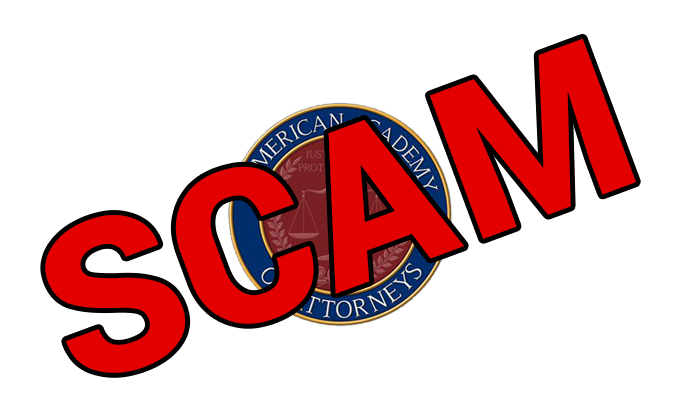
American Association of Premier DUI Attorneys – SCAM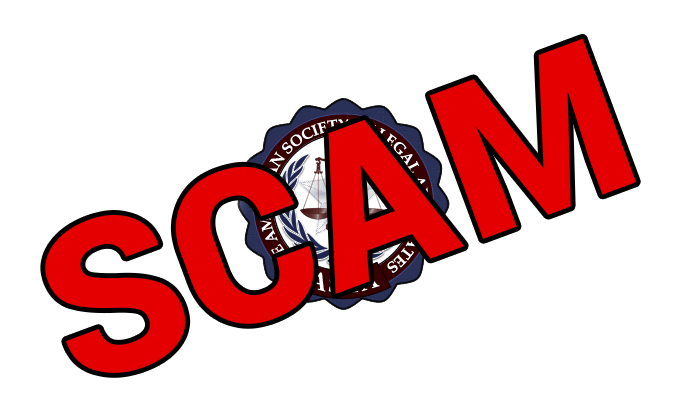
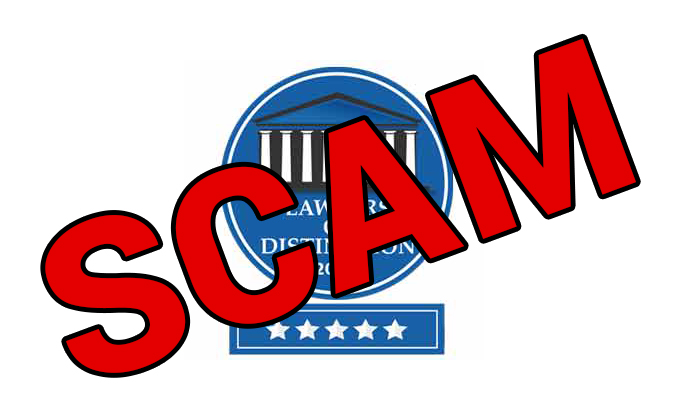
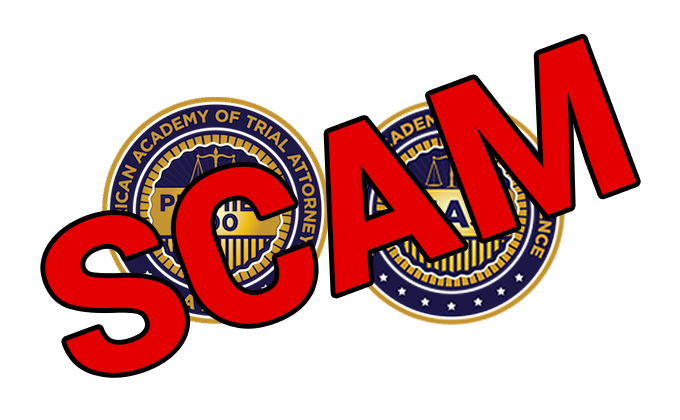
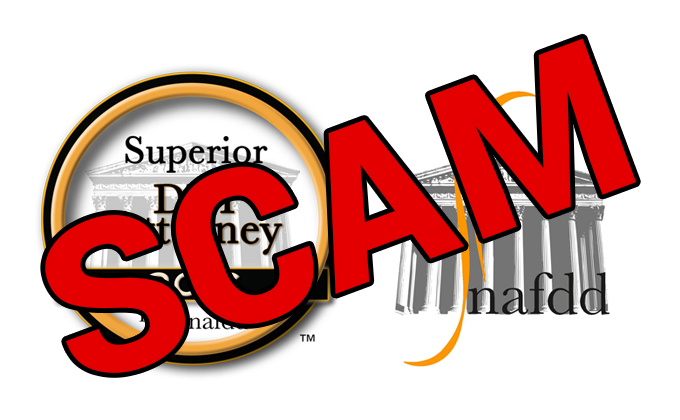
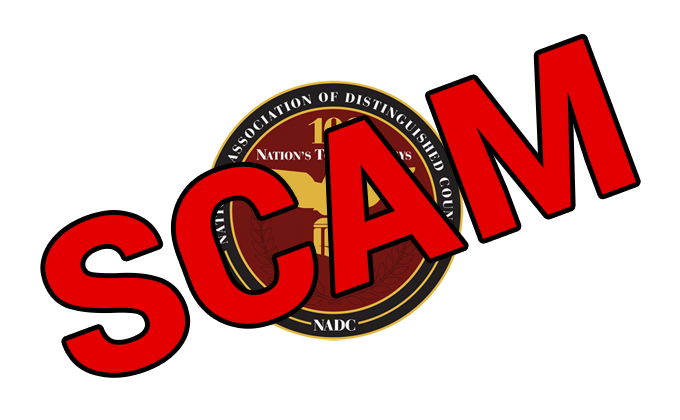
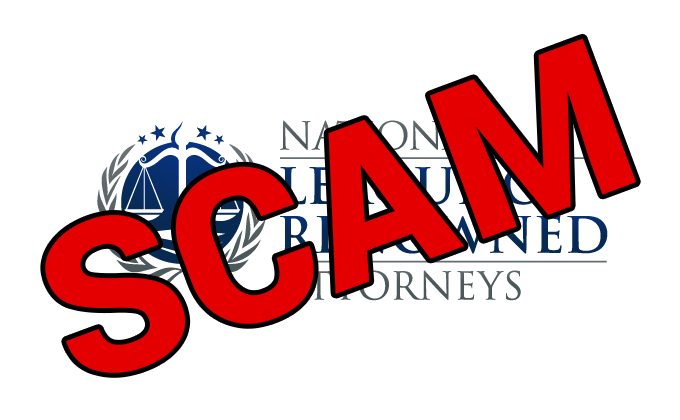
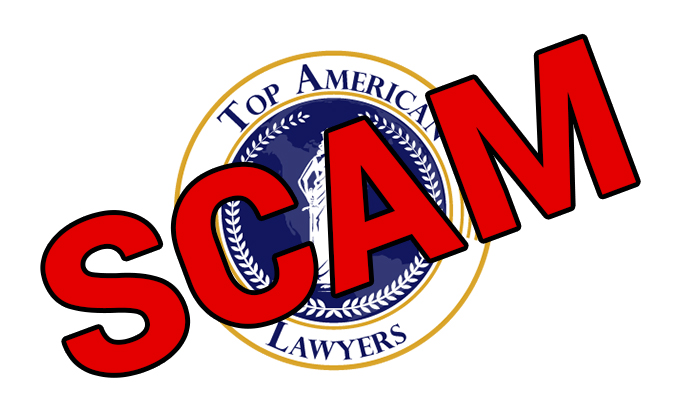
American Jurist Institute – SCAM
America’s Top 100 Attorneys – SCAM



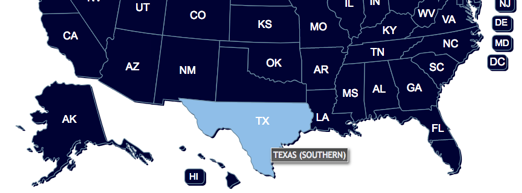
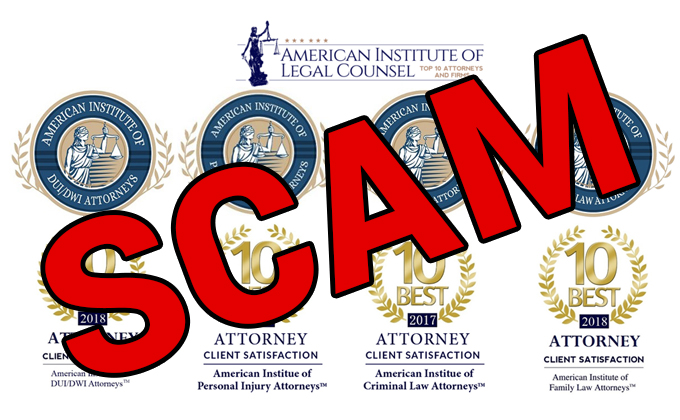
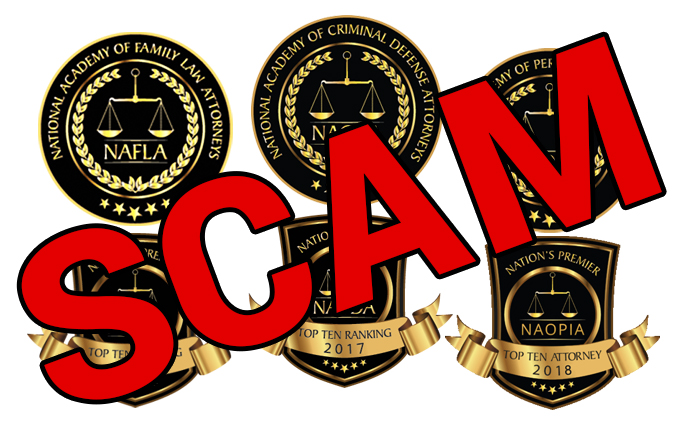
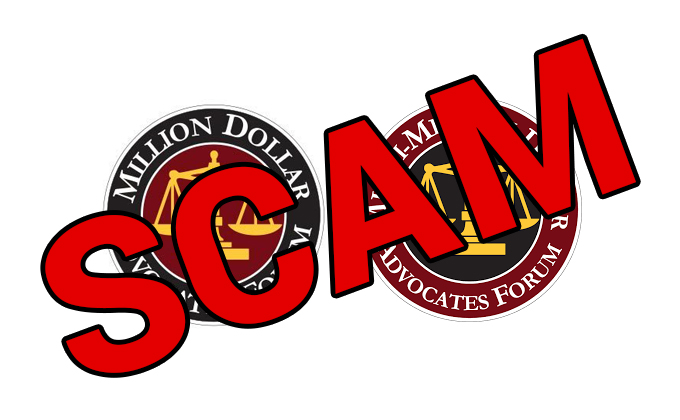
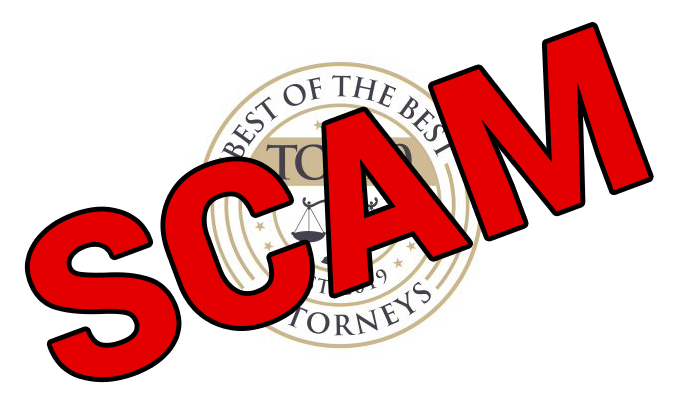
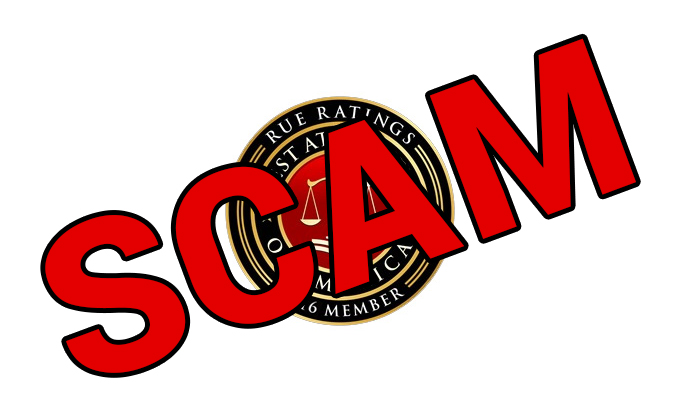
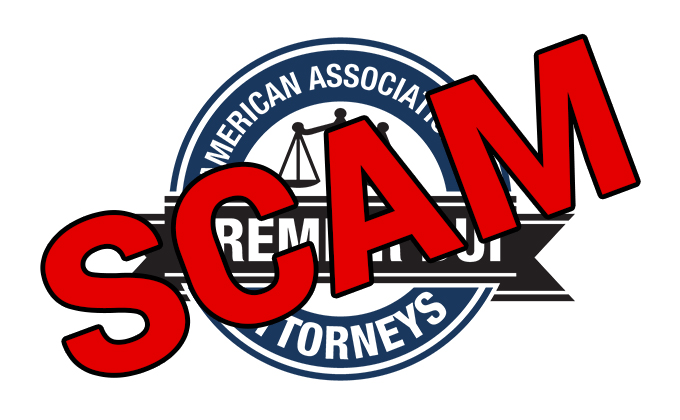
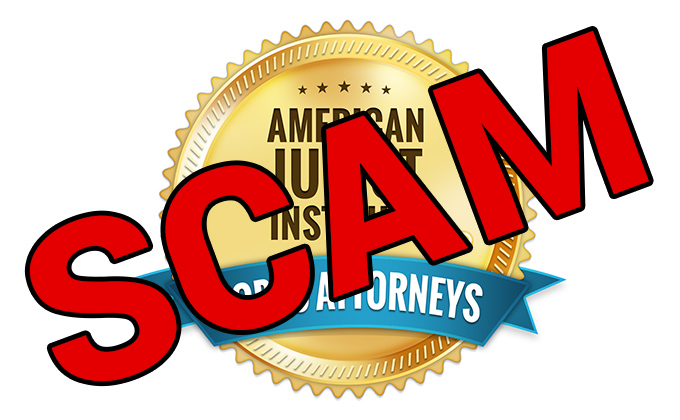
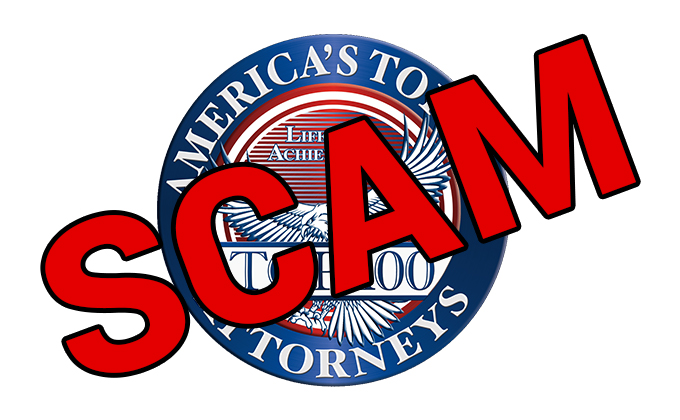



You are committing slander in this article and I would advise that you remove it before legal action is taken. How are you a law firm marketing firm and don’t know the law. A disclaimer does not immune you from being liable. how do you know these businesses selection process? You don’t.. So how can say “there is no selection criteria whatsoever” . that’s textbook slander.
Uh, Slander is Spoken Defamation, and this is a WRITTEN article. That would constitute possible LIBEL, Not Slander.
Legal Legions is owned by you. So that’s the real reason you bashing the other organizations. You should put that disclaimer in your article
I always thought this about Martindale and Hubbard and AVVO and the like. That if you pay, you get a higher rating or listed as a “Member.” Basically buying your reputation. Are they not scams because we get something more than just a badge from them?
Thanks for the comment Lisa! Great question. I don’t consider Martindale or Avvo to be “scams” because the ratings they give you are not affected by whether or not you pay. However, Martindale’s “AV Preeminent” rating, much like Avvo’s “10 out of 10 Superb” rating, Justia’s “10.0 Lawyer Rating,” and Thomson Reuter’s “Super Lawyer” and “Rising Star” are largely based on peer endorsements. Lawyers are given these “ratings” based on vague criteria, mostly consisting of the lawyer’s popularity with other lawyers, so there really is not much science behind them. While lawyers don’t have to pay to receive these ratings the lawyers do have to pay to have their phone number, headshot and link to their website displayed on their profile page (with the exception of Justia). Avvo was acquired by Martindale a few years ago. It was around that time that Avvo decided to strip the phone number and website link from the lawyer’s profile page if they are not paying. I believe this decision was made to match Martindale’s model due to the acquisition. My use of the word “scam” is subjective and what I mean by it refers to situations in which there is no criteria (or non-sensical criteria) used to “award” lawyers with the designation and the lawyer absolutely has to pay in order to receive the “award.” Also, Martindale and Avvo are both reputable companies with high-traffic from consumers and they do provide many legitimate services to lawyers. For those reasons, Avvo and Martindale do not fit my definition of a “scam.” They are both just commercial entities recognizing certain lawyers based on very vague criteria and then requiring the lawyers to pay for strong visibility in their directories and to have their contact information displayed in the directories. They do not, however, require lawyers to pay for the actual ratings.
I have never asked for any lawyer to endorse me for the Super Lawyers in my field in NJ and I have been selected each year since 2010, so I am not sure that it’s a popularity contest. They do have an oversight committee for selections. However, I agree that I have received several solicitations from sites such as “National Academy of personal Injury Attorneys” or “National Academy of Family Law Attorneys” telling me I have been chosen as a Top 100 in my state and found that just about every lawyer I knew got the same letter. Plus they have the same D.C. address and charge for you to get the “honor” by virtue of a membership fee. I consider that a scam.
Thank you! so what do you think of “Best Lawyers in America”? also, is “10 Best Attorneys” by the American Institute of Family Law Attorneys a “scam” — is it pay for play?
Thank you! so what do you think of “Best Lawyers in America”? also, is “10 Best Attorneys” by the American Institute of Family Law Attorneys a “scam” — is it pay for play?
and what about Who’s Who of Top attorneys? Thanks!
You really cannot be serious about Justia being a good site. The one thing you can know by looking at those listings – with few exceptions – is that if the lawyer is listed there they are desperate to get listed in something. Unable to gain admission to ABOTA or the American College of Trial Lawyers or a handful of other truly legitimate peer-selected, judge-approved, carefully vetted organizations devoted to something other than plaques and egos, they get themselves listed on Justia. The tell used to be the size of the Yellow Pages ad – the bigger the ad the worse the lawyer. Now it’s ego listings, so this article pointing out the worst of the scams is valuable.
Justia is nothing but a link farm owned by an individual. It is there for one reason, to boost Justia client websites. It’s a joke to think it’s legit.
Is mail from “American Trial Academy” considered a scam?
AVVO and other similar sites are highly questionable. True, their rankings are based upon “reviews” but I cannot think of one attorney who would not opt-out if allowed.
Anyone can post a 1 or 2 star review for an attorney, even if you have never spoken with them. I personally know a couple of attorneys who have posted bad reviews for their competition. I personally have a 1 star review sitting on my AVVO profile from someone I never even heard of, and their claims of how they met me (through a 1-800 number) to the services I provided (blew a statute of limitations on a PI matter are fake. I never subscribed to any type of phone marketing, and I do ZERO plaintiff’s work and have never blown a statute of limitations. All I can do is say that in response, but it’s definitely a bad mark, and I don’t expect the casual consumer to be objective. I probably wouldn’t be either.
Likewise, using AVVO as the example, an attorney can go to one of those temporary e-mail address sites, and post 5 star reviews for themselves all day long, even if they deserve a string of one or two stars.
The powers that be regulate how we can advertise ourselves, there should be some regulations allowing attorney challenges to the bogus reviews. I know there are First Amendment issues, but some regulation akin to the regulations imposed on credit rating agencies may be in order.
From personal experience and governmental authority to demand and receive facts, I have concluded that attorney advertising as well as peer reviews (aka peer inducement) is a self-serving, mutually beneficial scam, skirting the letter and spirit of the laws written (with loopholes) to protect the “ignorant and desperate consumers who fall for these scams, as do many consumers of B.S. stories, legitimized by lawyers concocting non-sensical euphemisms like “puffing”. So, as could be expected, before long, lawyers wanting riches and fame, more than “justice for all” sold out and bought in to these ad scams. I APPLAUD YOUR BRAVERY AND WILLINGNESS TO ADDRESS THIS ISSUE PUBLICLY.
Very true. However, it usually is not lawyers posting fake reviews to defame competition. The real scam with negative fake reviews is from the so-called “reputation defender” businesses. They go around posting fake reviews, then they contact you to tell you about the review and offer to have it removed for a fee. Google may even be a part of the scam, as it does not vet people making reviews and refuses to remove fake reviews when notified that the review is fake.
A poster should have to prove they were a client of the lawyer.
Sorry my fat fibgertips and tiny typing keys led to my misspelling of the word “euphemisms”. No problem, I am still a “super lawyer”.
From personal experience and governmental authority to demand and receive facts, I have concluded that attorney advertising as well as peer endorsement (aka peer inducement) is a self-serving, mutually beneficial scam, skirting the letter and spirit of the laws written (with loopholes) to protect the ” ignorant and desperate consumers who fall for these scams, as do many consumers of B.S. stories, legitimized by lawyers concocting non-sensical uphemisms like “puffing”. So, as could be expected, before long, lawyers wanting riches and fame, more than ” justice for all” sold out and bought in to these ad scams. I APPLAUD YOUR BRAVERY AND WILLINGNESS TO ADDRESS THIS ISSUE PUBLICALLY.
Can the list be updated?
Just because Thomson Reuters bought Super Lawyers 10 years ago doesn’t mean it is not a scam. It is one. Just like Best Lawyers of America.
Is the National Trial Lawyers Top 40 under 40 such an ego scam? They do have events and seminars but the lingo in the invitation letter is pretty similar to the know scams listed above.
Please advise
The National Trial Lawyers Top 100 and Top 40 Under 40 is a legitimate organization!! Their office is located in Dothan, Alabama.
Thank you very much. This information was very useful.
I had no idea that lawyers join organizations. I want to find one that is in a good organization. The type that they are in will show me their true character.
The seemingly desperate-for-fame & media attention, self-proclaimed ‘Fashionista Lawyer’ & ill-fitting wig-wearer Sara Shulevitz Vorhand posted a pic on her Instagram page of her ‘Top 100 Lawyers’ fake gold-coloured certificate award….when I pointed-out to her that when you Google ‘Top 100 Lawyers’ & the first thing that comes up is this wonderful page…she promptly blocked me from her IG account….!
All of these things are scams.
Take AVVO for example. Most people don’t know ow that AVVO creates a profile for an attorney whether they like it or not. Further, AVVO will list your best reviews first if you subscribe.
Likewise, I am pretty sure there is a fee for Super Lawyers.
The only legitimate “organizations” are either local or state bar associations and the only “awards of distinction” and such are certifications or other special designations awarded or permitted by the specific state bar or Supreme Court. The rest are paid for awards, some of slightly more merit than others, which isn’t saying much.
When I started practicing law lawyers were not allowed to advertise. When you go to their websites today they list the high dollar victories but never the cases they lost. The is generally a looser in every case. Law used to be a profession. Now it’s just a way to make a living.
Speaking as an “ignorant” and “desperate” consumer, I too found this article helpful. It also has left me feeling a bit disheartened and hopeless. How can I find find a good family law lawyer? I don’t know anyone that has experience with any in my area. I have to assume that in a consultation the lawyer will likely put their best foot forward, using words and promises that on the surface sound great, only to find out after spending thousands and already knee deep in, they can’t back it up. Then, I’m stuck with depending on below par representation for the future and welfare of my children. What can I possibly do?